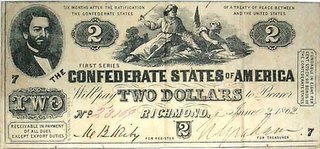Be Encouraged: God Does Not Issue Bluebacks

During the Civil War, the economic systems of the North and South were set on differing paths—at least in their ability to gasp for air. The South was suffering grievously due to the North’s naval blockade, which disallowed the transport of the southern mainstay—cotton. Although fairing better than the South, the North was hardly swimming in a sea of revenue.
As early as 1861, the first year of the war, Lincoln and his cabinet were forced to make tough economic choices. One such choice was to increase duties and excise taxes. Another was to issue “greenbacks.” Greenbacks were printing-press currency backed by the federal government. Because it was not supported by gold, the greenback’s value was determined by how much the government could borrow; as a result, the value of the greenbacks fluctuated with each battle. The problem was resolved, however, by the passing of the National Banking Act of 1863. This act allowed banks to issue currency based on the purchase of government bonds, thus stabilizing the greenbacks.
As mentioned, the South was fairing much worse, lacking the industrial might and commerce of the North. In response to this dire situation, Davis’ administration imposed a 10% increase of taxes on farm produce. Of course, this did not sit well with the states’-rights southerners who opposed direct taxation by a central government. Only 1% of the Confederacy’s revenue was derived from this measure. Consequently, revenue quickly dried up.
So out came plan B: Printing press currency. The South began printing “blue-backed” paper money. Once the printing presses began to hum, the flow of currency into the market place would not be ebbed. Runaway inflation ensued. For example, if you and two others decided to have breakfast in 1864 Richmond, you would leave a $21.15 tip—that’s 15% of $141, the cost of the meal. By the time Lee surrendered, the Confederacy was experiencing inflation of 9,000 percent.
What's This All About?
You’re probably wondering why we’ve taken this short trip down history lane. Well, hanging in my hallway at home is a $5 blue-backed bill, which was issued on February 17, 1864. The full faith and trust of the Confederate States of America backed this note. I’m sure this pledge gave solace to the note’s original recipient. Today, however, the bill is worthless as currency, holding value by historians and history buffs only. This note is void, despite the intentions and promises of the Confederate government.
History reveals that regimes come and go; political philosophies fail; nations rise and fall, their destinies not being in their hands. But with God, this is not so. Actually, He determines the times and seasons of nations and men.
(Acts 17:26)
(Ephesians 1:11)
(Daniel 4:35 )
(Isaiah 55:11)
--The Catechizer
Labels: Doctrine of God, History




0 Comments:
Post a Comment
<< Home